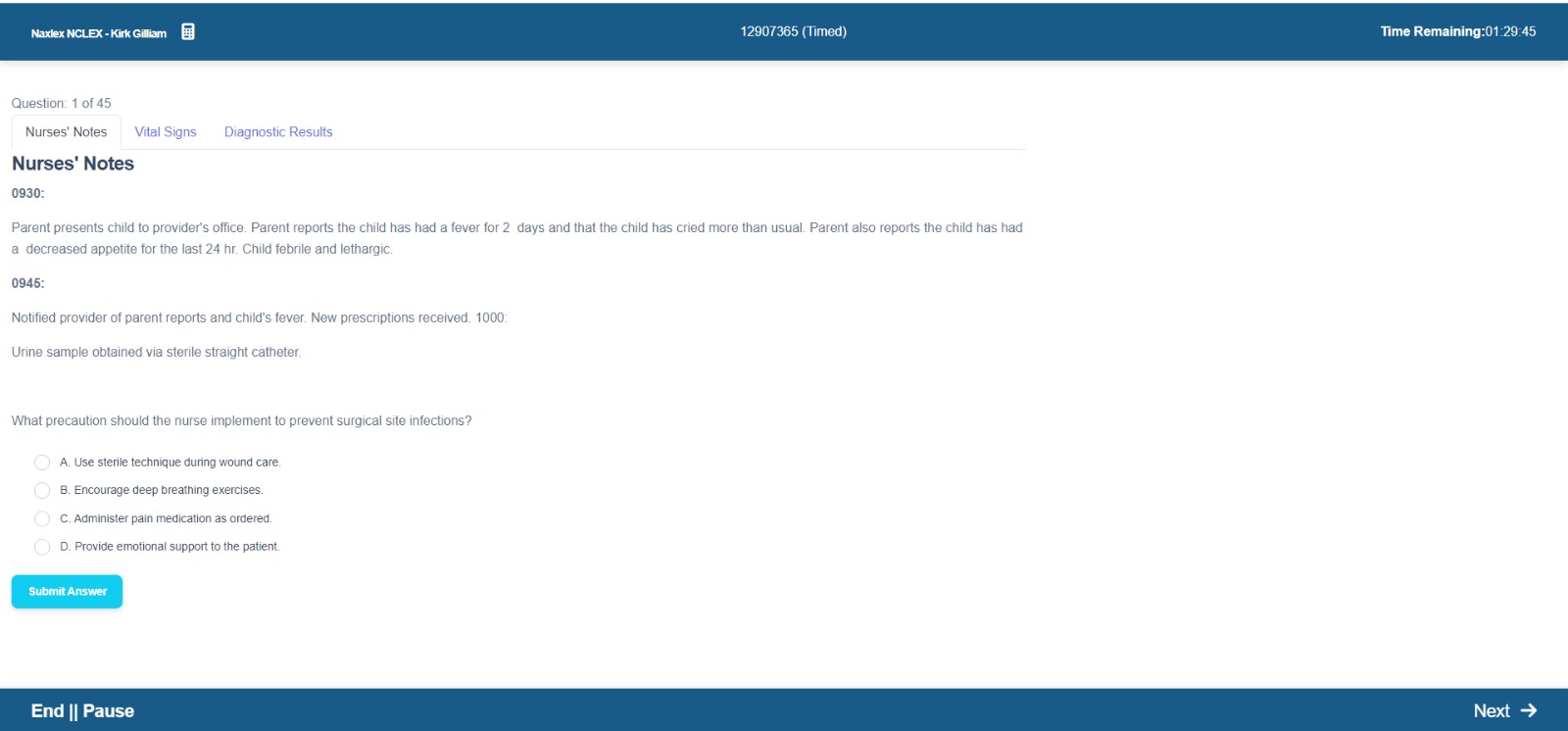NCLEX Case Study Questions - Free Questions and Answers
One of the greatest changes on the next Generation NCLEX test is a move towards case study questions. NCLEX case study questions require candidates to master deeper critical thinking and understand clinical diseases, especially pathophysiology. Mastering the two areas makes this kind of item easier to answer.
This article explores deeply the NCLEX case study questions and their formats to help you prepare effectively for the exam. Different scenarios will be discussed to help understand how to respond to the questions. Naxlex is a great platform that can help you prepare for case study questions with ease. Subscribe to Naxlex case study questions for guaranteed A.
NCLEX case study questions have been designed to evaluate the critical judgment of aspiring nurses. The National Council of State Boards of Nursing (NCSBN) developed the case study questions to prepare future nurses effectively. The nursing profession has become more challenging with the development of new technologies to address emerging diseases.
To address the different nursing challenges, the NCSBN added NCLEX case studies to evaluate future nurses' clinical competencies better. Adding clinical judgment skills to the case studies is crucial to ensuring that future nurses are equipped with the skills needed for effective nursing care.

Types of NCLEX Case Study Questions
A considerable change to the NCLEX exam is the introduction of twelve case study questions and two stand-alone question types. The twelve NCLEX case study questions comprise different kinds, such as;
-
Multiple-response questions incorporating Select All that Apply (SATA)
-
Multiple-response items incorporating Select N
-
Grouping-based multiple-response questions
-
Drag-and-drop: Rationales items
-
Drop-down: Cloze questions
-
Drop-down: Rationale items
-
Drop-down: Table based questions
-
Highlight: Table-based questions
The Format of NCLEX Case Study Questions
The NCLEX case study questions are showcased in a split-screen format. The displayed formats comprise the left and right sides. The left side explores scenarios and consists of patient care information with tabs for nursing records, laboratory results, orders, crucial symptoms, and patient history.
Tabs are provided throughout the NCLEX case study questions and may include extra information relating to case progression, just like in real life. Changes to the client's condition are explored when more treatment-related information becomes available. The right side of the NCLEX case study questions contains the questions to be answered.
The questions evaluated are in the form of new kinds specifically created to evaluate clinical judgment among aspiring nurses. NCLEX case study questions are updated automatically. When a candidate responds to a question, the screen updates the answers and presents a new question on the right side.
It's important to understand that once a question is answered, the patient information on the left side may remain the same or include new data. NCLEX case study questions on the right will change once each question is answered. Questions in the case study are not computer-adaptive, but an estimate of the performance will be shown at the end of each study.
What's Examined in NCLEX Case Study Questions?
In the NCLEX case study questions, candidates must answer six questions, each evaluating one of the six cognitive components of clinical judgment to ensure aspiring nurses are fully prepared for the challenge. The six parameters tested in the case study questions are;
-
Recognize Cues (Assessment): Any case study section may lead to successful patient diagnosis. Diagnosing and organizing information from different sources is crucial for future nurses.
-
Analyze Cues (Analysis): Nurses must design and execute client care programs using cues.
-
Prioritize hypothesis (Initiation): It's paramount to hypothesize probable conditions from established and analyzed cues. Nurses must discover any foreseeable conditions to patient care as needed.
-
Generate solutions (Planning): Nurses must narrow down clinical hypotheses and design patient care according to expected conditions.
-
Take actions (Implementation): Once foreseeable results are agreed upon and the priority of nursing care is created, nurses must start administering patient care.
-
Evaluate outcomes (evaluation): Following effective nursing care, nurses must assess the results of their treatment methods and judge their effectiveness.
The six sections evaluated in NCLEX case study questions aim to empower aspiring nurses with the skills, knowledge, and competencies needed to provide effective nursing care. Understanding the six aspects of the case study questions is necessary for better performance.
How to Prepare for NCLEX Case Study Questions
NCLEX case study questions are designed uniquely to evaluate nurses in a manner that other parts of the exam do not. Hypothetically, each case study question contains six questions that relate to a client. Case study questions evaluate key nursing skills such as patient symptoms, reading laboratory reports, and how to provide effective client care.
Effective preparation of the NCLEX case study questions is paramount because candidates must stay on track to change earlier answers. Good test preparation tips and strategies before the case study questions can help you prepare better. Candidates must provide final answers and get instant feedback on whether the answer was right or wrong as the case develops.
As you prepare for the NCLEX case study questions, you must take adequate time to understand how symptoms, patient information, treatment methods, and diseases fit together. The case study questions on the next-generation NCLEX test stimulate exam takers to come to faster conclusions regarding what's evaluated.
NCLEX case study questions need critical analysis of nursing concepts; the first step is to get detailed information about various diseases. If a particular case study question proves difficult, that's an indication that you need to spend sufficient time trying to understand the complexities of that issue. Whenever you find challenging case study questions, you should spend more time studying what was covered in that piece.
Difficult concepts of the NCLEX case study questions can be simplified through better test preparation materials. Practice case study questions are potent preparation tools you can use to pass the NCLEX exam the first time. Naxlex is the leading platform that guarantees an A on the exam. Join Naxlex for guaranteed NCLEX performance.
Start your journey with us today
Join 1000+ Nursing Students
Powerful learning and clinical tools combined into one platform. The Naxlex Knowledge and Qbanks give you instant and on-the-go nursing knowledge and guidance.




